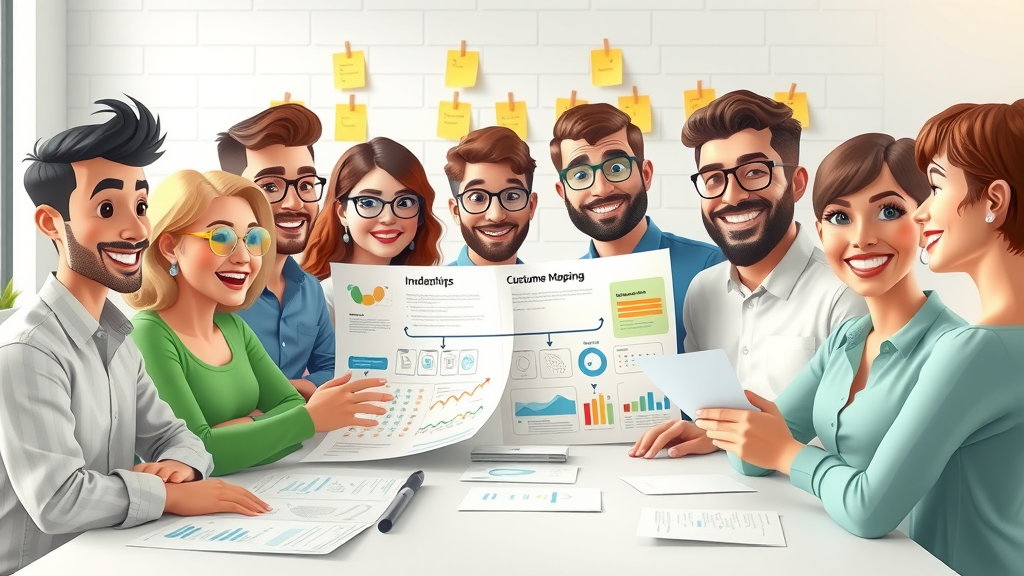Did you know that over 75% of companies using innovative digital marketing strategies far outperform their competitors in both revenue and brand awareness? The digital landscape is shifting fast – what worked yesterday may not work tomorrow. If you’re ready to disrupt your marketing plan with strategies that yield bigger results, you’re in the right place. In this guide, we’ll deliver surprising trends, actionable tactics, and real-world insights that will redefine your understanding of digital marketing strategies .
Unlocking the Power of Digital Marketing Strategies: Surprising Trends and the Case for a Modern Marketing Plan
The past year has shown that businesses leveraging a modern marketing plan are consistently outpacing their rivals. The secret? Harnessing effective digital marketing strategies that blend creativity, technology, and analytics. From integrating AI-powered platforms to embracing user-driven content, digital marketing is now more dynamic and responsive than ever. Real-life case studies highlight brands doubling their conversion rate through focused digital strategy rather than old-school blanket advertising.
In a world overflowing with messaging, cutting through the noise is a true challenge. That’s why aligning your digital marketing strategies with emerging trends is crucial for growth. By prioritizing your target audience , optimizing campaigns for every marketing channel , and making data-backed decisions, you can ensure every marketing effort delivers results. Below you'll find a detailed look at unconventional but effective methods to upgrade your online marketing footprint.

Why Digital Marketing Strategies Matter in Today’s Digital Economy
In today’s hyper-connected world, digital marketing strategies are the backbone of any successful brand. With consumers spending more than seven hours a day online, your opportunity to connect and convert has never been more significant. Implementing a dynamic strategy is not just about following trends—it's about leveraging data and creativity to make meaningful, measurable impacts on your business goals . The right strategy builds brand loyalty, improves your conversion rate , and propels sustained growth.
A robust digital marketing strategy offers diversity and agility. You’re able to tap into search engines, leverage social media engagement, and create content that resonates. As algorithms evolve and competition heats up, only the most adaptable and insight-driven approaches maximize ROI. Whether you’re a small startup or an industry leader, understanding the “why” behind digital marketing strategies is the first step in designing a plan that delivers.
What You'll Gain from Mastering Digital Marketing Strategies
- Gain actionable knowledge on the latest digital marketing strategy essentials
- Learn how to align your digital marketing plan with your business goals
- Harness effective digital marketing tactics to boost your conversion rate
- Explore the key types and pillars of successful digital marketing
| Strategy Type | Best For | Main Channel | Top Metric |
|---|---|---|---|
| SEO | Organic growth & visibility | Search Engines | Traffic/Ranking |
| Social Media | Brand awareness & engagement | Facebook, Instagram, LinkedIn, X/Twitter | Engagement Rate |
| Email Marketing | Lead nurturing & direct communication | Email platforms | Open/Click Rate |
| Content Marketing | Expertise & trust-building | Blogs, Videos, Infographics | Time on Page/Shares |
| Paid Ads (PPC) | Quick traffic & conversion boosts | Google Ads, Social Media Ads | Cost per Acquisition |
"A comprehensive digital marketing strategy can drive 3X more leads than traditional channels alone." – Industry Study

Essential Components of Any Digital Marketing Strategy
Establishing Your Target Audience and Creating Buyer Personas
Every effective digital marketing strategy begins with a deep understanding of your target audience . Defining who your customers are, their pain points, and buyer journey is vital to customizing messaging and format. By developing rich buyer personas , your marketing team can tailor content, offers, and channels to match each segment’s needs. This process requires research, surveys, interviews, and data analysis to create detailed personas that actually reflect your ideal prospects.
A well-crafted buyer persona does more than just segment your audience; it gives you a living reference point for every marketing campaign . For example, when creating a blog post or designing an email marketing sequence, referencing your primary buyer persona ensures your message hits home. Aligning your marketing plan with these personas helps sharpen your value proposition and increases the relevance of your tactics across all marketing channels .

Aligning Digital Marketing Strategies to Business Goals
Having an amazing marketing plan is pointless without a clear link to your business goals . Whether you aim to boost sales, increase brand awareness , or capture more leads, aligning your strategy to these objectives ensures every dollar you spend drives the right outcome. Effective digital marketing means continuous alignment—each tactic, from SEO to email campaigns, should ladder up to grow your business in measurable ways.
To successfully align your digital marketing strategy with business goals, you must define key metrics for success. For example, if your aim is to improve retention, focus on nurturing campaigns and personalized content marketing . If growth is your endgame, prioritize channels that offer scalability like paid ads or SEO. By connecting the dots between strategy, tactics, and goals, your marketing efforts become both efficient and agile, ready to adapt as objectives evolve.
Mapping Your Digital Marketing Plan: Channels, Tactics, and Budget Allocation
A comprehensive digital marketing plan outlines the marketing channels you’ll use, the core marketing tactics to deploy, and the budget for each. First, audit which channels currently deliver ROI—whether it’s social media marketing , email marketing , or pay-per-click ads. Next, anchor each tactic to a business goal and forecast spend, factoring in both fixed and variable costs.
Smart marketers use a mix of channels but understand that omnichannel success depends on data-driven decision making. For instance, dividing budget 50-30-20 for PPC, social, and content ensures you’re diversifying risk while amplifying reach. Periodically measure channel effectiveness and reallocate spend as necessary. Regular reviews allow you to swap out underperforming tactics for more effective digital marketing approaches, maximizing every marketing effort.
Building Blocks of Effective Digital Marketing: Core Marketing Strategies That Work
The Role of Content Marketing in Your Digital Strategy
Content marketing is the lifeblood of any winning digital marketing strategy. From in-depth blog posts to high-value downloadable guides and engaging videos, content delivers the expertise and trust your brand needs to attract, nurture, and convert leads. High-quality content doesn’t just raise your profile; it establishes your business as an authority in your niche and boosts your search engine rankings.
But not all content is created equal. Effective digital marketing comes from understanding what your target audience craves and how they search. Use keyword research, social listening, and competitor analysis to fuel your editorial calendar and provide answers before your prospects even ask. Every piece, from emails to blog posts, should serve a specific purpose within your broader marketing plan, ensuring consistency, value, and a measurable impact on your conversion rate.

Social Media Marketing: Leveraging Platforms for Engagement
Social media marketing lets you build brand personality, connect instantly with customers, and amplify word-of-mouth. Each platform, from Instagram to LinkedIn, offers unique opportunities and challenges for digital marketers. By creating platform-specific strategies using relevant hashtags, stories, and user-generated content, you supercharge engagement, spark conversations, and drive action.
The key to social media success is knowing where your target audience spends time and delivering content that resonates. Monitor evolving trends—like short-form videos or authenticity-driven campaigns—and stay committed to regular posting and direct engagement. Social media is no longer a nice-to-have but a must-have component of your effective digital marketing mix. Real-time feedback lets you tweak your tactics for every campaign, ensuring resources go where they have the greatest impact.
Search Engine Optimization: Driving Organic Growth
Ranking at the top of search engines remains one of the most effective digital marketing tactics for long-term growth. SEO strategies improve your site’s visibility, allowing your audience to find you via Google and Bing rather than paid placements alone. It’s not just about keywords; modern SEO encompasses site speed, user experience, schema markups, and mobile optimization, ensuring your website meets both algorithm and human needs.
A holistic search engine marketing plan involves a blend of on-page optimization (like meta descriptions and header tags), technical fixes, and authoritative backlinks. Regular audits keep your site in good shape as algorithms evolve. Given that over 53% of website traffic comes from organic search, it’s clear that a robust SEO strategy is foundational to every digital marketing strategy , fueling awareness, credibility, and ultimately conversion.

Effective Email Marketing Campaigns for Increased Conversion Rate
Email remains a cornerstone of digital marketing because of its unparalleled ROI and ability to nurture leads. Effective email marketing campaigns deliver personalized messages, timely offers, and value-driven content directly to an engaged audience. With advanced segmentation, you can tailor campaigns to specific buyer personas, ensuring that your communication is always relevant.
Tracking open rates, CTR, and conversion rate helps you refine your approach, guiding your messaging and frequency. Automated drip campaigns and behavior-triggered sequences create a user journey that feels personal and drives steady results. When integrated with your broader digital marketing strategy , email keeps your brand top of mind at every stage of the funnel.
Maximizing Paid Marketing: PPC, Retargeting, and Media Marketing
Sometimes organic growth needs a powerful assist, which is where paid digital marketing like PPC and media marketing comes in. Running precise search engine ads (Google Ads) or social campaigns (Facebook, Instagram) lets you capture demand fast and move prospects swiftly to conversion. With advanced retargeting, you win back website visitors and nurture them back to a sale.
The magic lies in hyper-targeted audience segmentation, creative ad design, and ongoing optimization. Testing various headlines, offers, and placements ensures your budget is spent wisely on channels that consistently deliver a strong conversion rate. Whether launching a short-term promotion or supporting a major marketing campaign, paid media should sync with your organic marketing efforts to maximize effectiveness.
| Channel | Estimated Reach | Cost Range | Effectiveness (ROI) |
|---|---|---|---|
| SEO | High (broad, intent-driven) | Low–Mid (time-intensive) | Very High |
| Paid Social | Very High (targeted) | Mid–High | High |
| Moderate (opt-in lists) | Low | Very High | |
| Content | High (organic/discovery) | Low–Mid | High |
| PPC | High (quick results) | Mid–High | High |
Developing a Winning Digital Marketing Campaign: From Ideation to Execution
Crafting a Multi-Channel Marketing Campaign That Resonates
Designing a compelling digital marketing campaign means knowing how to reach your customers where they actually live online. Start by outlining campaign goals and key performance indicators. Use your buyer personas to map out messaging, assets, and touchpoints to deploy across channels—which might include social stories, blog posts, video ads, and targeted email blasts.
Successful marketing campaigns are integrated, not siloed. Each touchpoint reinforces the core message and call-to-action, no matter where the prospect encounters it. For instance, a new product launch could cascade from a blog announcement, to teaser videos on social media, to a high-converting email offer. Always monitor campaign performance in real time, adjusting creative and channel mix as you go.

Optimizing Your Landing Page for Higher Conversion Rate
Every successful marketing campaign needs a high-converting landing page . This is where your traffic turns into leads or sales—in other words, where your marketing tactics meet your business goals. Essential elements include a clear headline, focused benefits, compelling visuals, and a frictionless call-to-action. Leverage A/B testing on elements like layout, form fields, and CTA copy to discover what drives the highest conversion rates.
Adding trust signals—like testimonials, badges, or social proof—further boosts results. When integrating landing page best practices into your broader digital strategy, ensure consistent messaging from ad click to page, and minimize distractions so users stay focused. Don’t overlook the importance of speed, mobile responsiveness, and analytics tracking. An optimized landing page doesn’t just improve one campaign, but lifts the ROI of your entire marketing funnel.
Monitoring, Measuring, and Adjusting Digital Marketing Strategies
No digital marketing strategy is set in stone; success depends on a constant cycle of measurement and refinement. Use analytics tools to monitor every campaign and channel, tracking KPIs like website traffic, bounce rate, engagement, and conversions. Identify what’s working—and what’s not—so you can reallocate resources to the highest-impact tactics and pivot quickly to market changes.
Set up regular strategy reviews, whether weekly or monthly, so your team can brainstorm improvements based on real-world results. Look at both high-level trends and granular data, adjusting your messaging, offers, or channel mix as needed. Over time, this continuous optimization process transforms marketing challenges into competitive advantages, ensuring you always stay ahead of the curve.

"The best digital marketing strategies are never set-and-forget—they adapt to analytics and audience behavior." – Industry Thought Leader
Innovative & Effective Digital Marketing Tactics for 2024
AI, Automation, and Personalization: The Future of Digital Marketing
Artificial Intelligence (AI) and automation are transforming how brands reach and delight their customers. Leveraging AI-driven personalization engines, chatbots, and automations, marketers can deliver hyper-relevant content, offers, and experiences to each individual in real time. Automation tools streamline everything from workflow management to send schedules, freeing your team to focus on high-level strategy and creative innovation.
In 2024, successful digital marketing strategies will be built around personalization at scale. Instead of one-size-fits-all messaging, AI enables dynamic content and tailored recommendations—even as users click through your site or interact on social media. Embrace these cutting-edge tools to keep your campaigns fresh, your messaging on target, and your conversion rate rising.

Earned Media, Influencers, and Social Proof as Modern Marketing Tactics
Earned media —from press mentions to influencer posts and customer reviews—offers powerful third-party validation that’s impossible to buy. Instead of broadcasting the company’s message, effective digital marketing strategies cultivate real relationships with media, niche experts, and content creators who share your brand’s story authentically.
Partnering with the right influencers can broaden your reach overnight, while social proof such as user reviews and testimonials drives trust and conversions. Incorporating earned media into your digital marketing plan is essential for brands looking to build credibility and boost ROI, making it a key complement to paid and owned marketing tactics.
Staying Agile: Adapting Your Marketing Strategy to Rapid Changes
The only constant in digital marketing is change. Whether it’s algorithm updates, emerging platforms, or shifts in consumer behavior, your digital marketing strategy must remain agile. Pivoting quickly and testing creative solutions keeps your brand relevant and your campaigns effective—even in volatile conditions.
Lean into continuous learning and rapid experimentation. Monitor competitors, follow industry news, and foster a culture where every marketing effort is subject to optimization. Agility isn’t about abandoning your core tactics—it’s about staying responsive and resilient, so you can turn unexpected changes into breakthrough growth opportunities.
Case Studies: How Digital Marketing Strategy Drives Real Results
Digital Strategy Success Story: A Small Business’s Roadmap to Growth
Take the example of a local coffee shop that embraced a robust digital marketing strategy after years of flat growth. By refining their buyer personas and tailoring their content for Instagram and local Facebook groups, they quickly grew their social media following. Next, they launched an email marketing loyalty program offering exclusive discounts and updates, doubling their repeat customer rates within three months.
Their new blog post series highlighting local community initiatives resonated with their target audience and earned positive press coverage (earned media). The results spoke for themselves – foot traffic increased by 40%, their email list tripled, and online reviews soared, directly correlating with higher sales and conversion rates .

Corporate Marketing Campaigns That Revolutionized Their Industries
On a larger scale, a major apparel retailer transformed its brand by adopting a cross-platform digital marketing campaign. Through integrated influencer partnerships, personalized email marketing, and a high-converting landing page, the brand revitalized its identity and doubled direct-to-consumer sales in less than a year. Retargeting ads kept past visitors engaged, while interactive social media campaigns drove new customer acquisition.
Their team’s constant monitoring and strategy adjustment allowed them to pivot quickly as fashion trends changed and customer feedback rolled in. This nimble approach enabled the brand to outperform traditional competitors, transform awareness into measurable growth, and redefine industry standards with their innovative marketing tactics.
| Brand | Key Change Implemented | Conversion Rate Before | Conversion Rate After | ROI Increase |
|---|---|---|---|---|
| Coffee Shop | Email loyalty + local social media | 2.5% | 5.4% | 116% |
| Apparel Retailer | Influencers + retargeting + landing page | 1.8% | 4.7% | 161% |
| B2B SaaS | SEO + Content marketing | 3.0% | 6.1% | 103% |
Lists of Essential Tools for Implementing Digital Marketing Strategies
- Social Media Scheduling Platforms
- SEO Keyword and Analytics Tools
- Content Management Systems
- Email Automation Platforms
- PPC and Paid Media Management Solutions
- Landing Page Optimization Tools

People Also Ask: Answering Common Questions About Digital Marketing Strategies
What are the strategies of digital marketing?
Digital marketing strategies include search engine optimization (SEO) , content marketing , social media marketing , paid advertising (PPC) , email marketing , and leveraging analytics to measure and optimize each marketing campaign. Effective strategies involve integrating these methods, aligning them to business goals, and continuously refining tactics based on performance data.
What are the 4 types of digital marketing?
The four main types of digital marketing are: content marketing , search engine marketing (including SEO and PPC), social media marketing , and email marketing . Most effective digital marketing strategies integrate multiple types to build a cohesive marketing plan that drives awareness, engagement, and conversions across platforms.
What are the 4 digital strategies?
Four digital strategies include: customer experience optimization , digital transformation of business operations , data-driven decision making , and integrated multichannel marketing strategies . These digital strategies help brands stay agile, deliver value, and outperform competitors in rapidly evolving markets.
What are the 7 C's of digital marketing?
The 7 C’s of digital marketing are: Content , Context , Community , Customization , Communication , Connection , and Commerce —each a pillar in building a sustainable digital marketing campaign. Mastering these enables brands to create authentic customer experiences and drive long-term business growth.
Frequently Asked Questions About Digital Marketing Strategies
How do I create a digital marketing strategy for my business?
Start by clarifying your business goals and identifying your target audience using detailed buyer personas . Map out the most effective marketing channels for your business, define KPIs, and set a budget. Build a content and campaign calendar, launch your marketing efforts, and use analytics to adjust your digital marketing plan continually.
What is the most effective digital marketing tactic in 2024?
In 2024, the most effective tactic is leveraging personalization through AI and automation. Combining data-driven insights with tailored content across multiple channels—like email marketing, social media, and search engine ads—delivers the highest ROI. Marketing success in 2024 means using tools that enable real-time personalization and ongoing optimization.
How can I measure the ROI of my digital marketing plan?
Track metrics like conversion rate , cost per acquisition, website traffic, customer lifetime value, and overall sales lift. Use analytics platforms (such as Google Analytics or built-in dashboard tools) to tie each channel’s performance to your business goals. Continual measurement is crucial for spotting trends, identifying high-performing marketing tactics, and maximizing ROI.
Is social media marketing enough on its own?
While social media marketing is vital for brand awareness and audience engagement, it should be part of an integrated marketing plan. Combining social with SEO, email marketing, and content marketing delivers the best results. A multi-channel approach ensures you reach prospects at every stage of the buying journey.
Expert Insights: Quotes from Top Digital Marketing Strategy Leaders
"In a world driven by data and personalization, the most effective digital strategies focus on understanding and serving your audience’s needs." – CEO, Leading Digital Agency
Key Takeaways for Building and Evolving Your Digital Marketing Strategies
- Effective digital marketing starts with understanding your business goals and audience.
- Use a combination of digital marketing tactics (SEO, content, social media, email) for the best results.
- Continuously monitor, test, and adjust your marketing strategies to outperform competitors.
- Innovation and adaptation are vital to maintaining and growing your brand’s digital presence.
Start Implementing These Digital Marketing Strategies for Business Growth Today
The future of digital marketing strategies is bright and filled with opportunities for those who act decisively. Get started now by choosing one new tactic, aligning it to your goals, and watching your marketing results soar.
 Add Row
Add Row  Add
Add 




Write A Comment